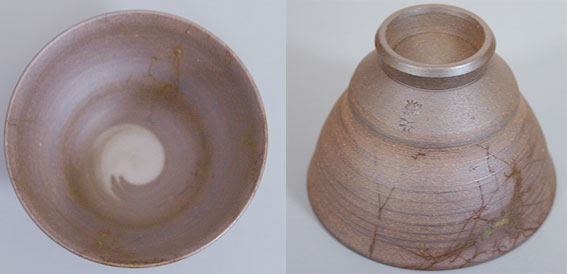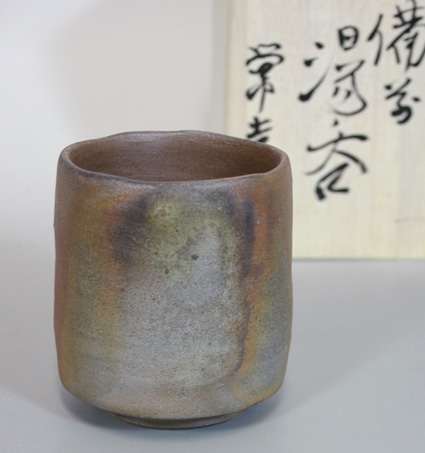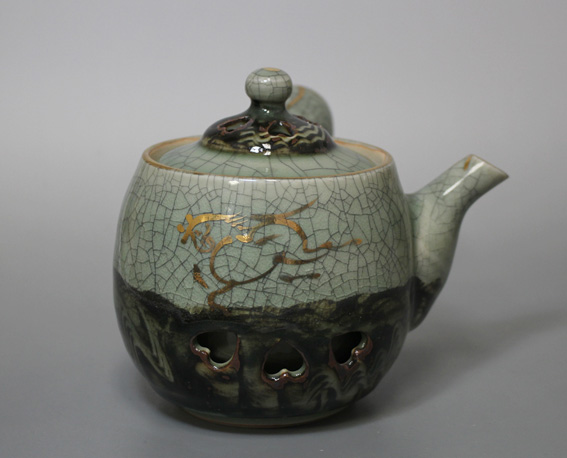Jun 28th, '08, 16:51
Posts: 1598
Joined: Jan 11th, '07, 16:13
Scrolling: scrolling
Location: SF Bay Area, CA
Contact:
scruffmcgruff
Thanks, chamekke.chamekke wrote:britt, that Taiwanese Mineral Ore teaset is stunning.!
I also tend to prefer, and have a much greater interest in, Japanese teaware compared to other types. I think the Taiwanese Mineral Ore set has characteristics that are similar to some Japanese teaware (yakishime?) from Bizen and Tokaname. The "rusty" look is similar to that of many Hokujo products. Hokujo achieves this affect by adding iron ore to the Tokoname clay. After firing, this gives an appearance similar to slightly rusting iron.chamekke wrote:I tend to gravitate towards the Japanese shore as teawares go, but your set is making me think I need to reassess!
I do find that Yixings have a certain charm about them but I don't find them to be very functional. They drip, spill, and can adversely affect the taste of tea, more so IMO than other types of teaware. I've had much less trouble getting good results from Chinese-Taiwanese tea brewed in Taiwanese teaware. I have had excellent results, though, with Wuyi and Dan Cong brewed in dedicated Yixings.
Most of the teaware I've seen on Taiwanese sites mimics either Yixing or Japanese teaware, sometimes even side-handled kyusu. The Taiwanese do seem to add their own touch to each. I've seen many pictures of Taiwanese tea ceremonies that included what look like Japanese teacups, including tastefully dripped glaze. I don't know if they're Taiwanese cups with a Japanese influence, or whether they're actually Japanese cups. Either way, I think the Japanese have influenced just about everybody and everything, and for good reason.
The Mineral Ore process, from what I've been able to find, is very difficult to manufacture and requires multiple firings. I don't know what the survival rate is, but the relatively high prices are consistent with this. The set of pot and two cups was $165, which is rather high. I can't complain, though, as this set was purchased specifically for aged oolongs and it has worked well with them from day one.
Last edited by britt on Jun 28th, '08, 17:28, edited 2 times in total.
Since all my Taiwanese teaware purchases were from Hou De, and I haven't seen these items elsewhere, I can't really make a price comparison. I think the Lin's site is in new Taiwan dollars, which I'm sure could be converted to USD easy enough, but I have no idea what their shipping charges would be.scruffmcgruff wrote:If language weren't an issue, I would much rather use Lin's site. Hou De tends to overcharge just a wee bit, heh.
I have a few co-workers who are from Taiwan, and I was thinking about asking one of them to help me navigate the Lin's site and possibly help me place an order. I'm sure they've all installed Chinese language character sets on their computers, which should help.
Only ones with a defect. Sometimes they show imperfection in shape because they are hand-made, clay born with high percentage of shrinking not because crafter was so sloppy at making.britt wrote:They drip, spill, and can adversely affect the taste of tea, more so IMO than other types of teaware.
It's not difficult to make a perfect pot with Qin Shui ni but even acclaimed master will hesitate to start making with Zhuni, but people still prefer Zhuni-made pot.
And other problem is that, chances are rare to get good yixings in America.
Jun 28th, '08, 23:31
Posts: 505
Joined: Jun 1st, '08, 11:57
Location: The Golden Horseshoe
Jun 28th, '08, 23:42
Posts: 5151
Joined: Dec 20th, '06, 23:33
Scrolling: scrolling
Location: Gainesville, Florida
Your wife sounds like she may have a suspicious nature.heavydoom wrote: ... she may think that i am about to make another purchase on the credit card ...
I am sorry to hear that they make you ill. Tell your wife how sick they look and she will come to realize that your interest in the site is purely academic.heavydoom wrote: ... they look absolutely sick!!
I am on the edge of my seat waiting to hear any glad tidings Lin may be able to convey to you by return email!
Jun 29th, '08, 00:13
Posts: 505
Joined: Jun 1st, '08, 11:57
Location: The Golden Horseshoe
Yeah, wives, girlfriends, and fiancees don't seem to understand that audio equipment, dvd's, and expensive teaware are actually necessities of life. When will they learn?heavydoom wrote:my wife is chinese, she can read the site but she may think that i am about to make another purchase on the credit card.
i have emailed lin, i hope she gets back to me, and i hope she can read english. i want that pot and that gaiwan. they look absolutely sick!!
Good luck!
Jun 29th, '08, 09:17
Posts: 505
Joined: Jun 1st, '08, 11:57
Location: The Golden Horseshoe
you hit the nail on its proverbial head! the killer is that they always want their rings, bags, flowers etc...britt wrote:Yeah, wives, girlfriends, and fiancees don't seem to understand that audio equipment, dvd's, and expensive teaware are actually necessities of life. When will they learn?heavydoom wrote:my wife is chinese, she can read the site but she may think that i am about to make another purchase on the credit card.
i have emailed lin, i hope she gets back to me, and i hope she can read english. i want that pot and that gaiwan. they look absolutely sick!!
Good luck!
Jun 29th, '08, 12:12
Posts: 1953
Joined: Apr 6th, '08, 19:02
Location: British Columbia, Canada
Contact:
chamekke
Maybe the same day that certain husbands work out that Japanese books, "obscure" teas and expensive teawares are also necessities of life.*britt wrote:Yeah, wives, girlfriends, and fiancees don't seem to understand that audio equipment, dvd's, and expensive teaware are actually necessities of life. When will they learn?
Our TeaStruggle crosses genders!
_____
*As are kimono for tea... but that's another story!
chamekke, I apologize for the one-way view and I offer the following compromise:chamekke wrote:Maybe the same day that certain husbands work out that Japanese books, "obscure" teas and expensive teawares are also necessities of life.*britt wrote:Yeah, wives, girlfriends, and fiancees don't seem to understand that audio equipment, dvd's, and expensive teaware are actually necessities of life. When will they learn?
Our TeaStruggle crosses genders!
_____
*As are kimono for tea... but that's another story!
We will now blame both opposite sexes for their lack of understanding instead of just one. To rephrase, "How come the other half never understands that tea, teaware, Japanese books, cd's, and audio equipment are necessities of life and that kimonos are required to perform in the tea ceremony?"
chamekke, you must be extremely patient if you had to explain that last one! What would sensei say if you performed the tea ceremony in jeans and sweater?
Here are some pictures of various styles of Japanese clay tea cups that I've purchased over the last several months. They include both glazed and unglazed (yakishime) cups.
Tokoname:
Mogake by Hokujo


Kyoyaki:
Haiyu Tessai

Shino:
Nezumi Shino by Tomio Suzuki

Style Unknown:
Haiyu Ash Glazed by Yuichi Ikai


Bizen:
Yohen Sangiri by Suzuki Tsuneki

Hagi:
Aohagi by Noutomi Susumu (this is my favorite cup/set but the only available picture is the thumbnail)

Somayaki:
Double Walled Cup

Double Walled Mug and Six Ounce Kyusu:


Tokoname:
Mogake by Hokujo


Kyoyaki:
Haiyu Tessai

Shino:
Nezumi Shino by Tomio Suzuki

Style Unknown:
Haiyu Ash Glazed by Yuichi Ikai


Bizen:
Yohen Sangiri by Suzuki Tsuneki

Hagi:
Aohagi by Noutomi Susumu (this is my favorite cup/set but the only available picture is the thumbnail)

Somayaki:
Double Walled Cup

Double Walled Mug and Six Ounce Kyusu:


Jun 29th, '08, 15:42
Posts: 5151
Joined: Dec 20th, '06, 23:33
Scrolling: scrolling
Location: Gainesville, Florida
Wow, these are all beautiful. While I lean mostly toward bright white interiors in my teacups, I am starting to drift ever so slightly off course toward ceramic. Even though I am a little uncomfortable with the less-than-clinical presentation of the tea liquor, I enjoy the feel and appearance of the ceramic.britt wrote:Here are some pictures of various styles of Japanese clay tea cups that I've purchased over the last several months.
Jun 29th, '08, 16:01
Posts: 1598
Joined: Jan 11th, '07, 16:13
Scrolling: scrolling
Location: SF Bay Area, CA
Contact:
scruffmcgruff
Britt, I like those Haiyu Tessai cups very much! Where did you find those?
Tea Nerd - www.teanerd.com
Thanks Salsero.Salsero wrote:Wow, these are all beautiful. While I lean mostly toward bright white interiors in my teacups, I am starting to drift ever so slightly off course toward ceramic. Even though I am a little uncomfortable with the less-than-clinical presentation of the tea liquor, I enjoy the feel and appearance of the ceramic.britt wrote:Here are some pictures of various styles of Japanese clay tea cups that I've purchased over the last several months.
A year ago when I started drinking good tea, I refused to use or purchase cups that weren't white inside. This severely limited my choices, or at least confined me pretty much to Kyoto and Arita. Those type of cups, although certainly good, aren't the best visual match for rustic kyusu such as Hokojo, which comprise the majority of my Japanese teaware.
I decided to compromise and purchased the Hokujo cups, which are unglazed brown clay inside and out. I enjoyed using them so much that I started buying more items that went against my initial criteria. I wish I hadn't, because this opened up a whole new area where I could use my credit card. I've been purchasing clay cups regularly ever since, although I did recently purchase a few white porcelain Arita's as well. I prefer using clay most of the time, for both feel and taste, but I must admit that the most accurate taste, be it good or bad, probably comes from the porcelain.
Some clay cups are available with white glazed interiors, although not usually porcelain. Tomio Suzuki, who made my three Nezumi Shino cups (one is pictured in my original post), also makes cups in the standard white Shino glaze. I don't own one yet, but I am waiting for the next lot from 2000 Cranes to be posted. That's one way to use clay and still see the true color of the tea.
A good compromise is the Aohagi set by Noutomi Susumu. The inside is glazed in a combination of very light blue (bottom of each cup), darker blue and white. The color of tea is actually enhanced to the point where it might make one's brewing skills appear to be better than they really are. At one point in tea history, the Chinese determined that light blue was the best color for the inside of a teacup. These were the tea masters, and they cheated too!
As much as I prefer clay, I do sometimes pull out the white porcelain Arita's just to keep myself alert. If the tea looks good, I'll return to the clay. I had Hatsumi for the first time this month and found it to be a difficult brewer. I used the Arita Dragon cups near the beginning just so I could see what the heck I was doing. What a mess! These cups helped me tame the beast, and I will now finish that batch with clay cups.